- Qualcomm Launches Snapdragon 4 Gen 2 Mobile Platform
- AMD Launches Ryzen PRO 7000 Series Mobile & Desktop Platform
- Intel Launches Sleek Single-Slot Arc Pro A60 Workstation Graphics Card
- NVIDIA Announces Latest Ada Lovelace Additions: GeForce RTX 4060 Ti & RTX 4060
- Maxon Redshift With AMD Radeon GPU Rendering Support Now Available
An In-depth Look At AMD’s Ryzen 7 1800X, 1700X & 1700 Processors

To call AMD’s Ryzen family of processors highly anticipated would be an understatement. The market has been craving innovation in the CPU space for some time. With a trio of competitively priced desktop chips configured with 8 cores that have experienced major IPC boosts over past chips, all of that waiting has paid off.
Page 7 – Linux: GeekBench, Blender, HandBrake & Phoronix Test Suite
(All of our tests are explained in detail on page 2.)
To wrap-up our performance results, we have a slew of Linux test results to pore over, which include two identical tests from the Windows suite (HandBrake and Blender).
The OS used in testing is Ubuntu 17.04, which is as out-of-the-box as we can make it. That means that the Nouveau driver is used for graphics (not that it should matter for CPU tests), and no unneeded software or services are installed. An exception: for the sake of improved AMD Ryzen support, the kernel has been upgraded to 4.10.1.
Most of our Linux testing is performed with the Phoronix Test Suite, which makes it ridiculously easy to benchmark a huge number of tests in one go, to let us, as Ronco famously said, “set it, and forget it!” Well, “forget it” until the next test needs to be run, anyway.
In addition to PTS, GeekBench is included for an overall performance look, while Blender and HandBrake are used for real-world testing.
GeekBench
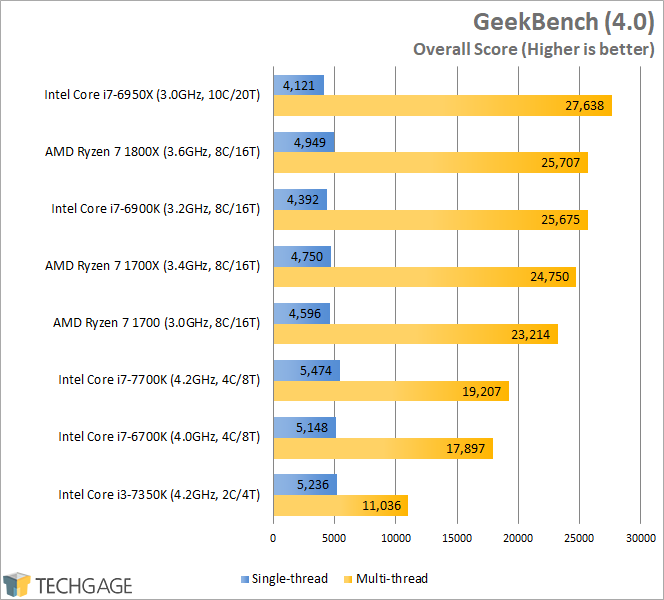
- AMD Ryzen 7 1700
- AMD Ryzen 7 1700X
- AMD Ryzen 7 1800X
- Intel Core i7-6700K
- Intel Core i3-7350K
- Intel Core i7-7700K
- Intel Core i7-6900K
- Intel Core i7-6950X
(Full results can be viewed at these links)
Both sets of results shine Ryzen in a great light here, with the single-threaded test aligning the chips close to Intel’s 8- and 10-core competition. It’s hard to beat Intel chips clocked at 4.20GHz, but pile on more cores, and Ryzen 7 can overtake those quad-cores with ease.
Compared to some other synthetic benchmarks tested in this article (Cinebench, POV-Ray), GeekBench has proven quite generous to Ryzen to put it so close to Intel’s big guns.
Blender & HandBrake
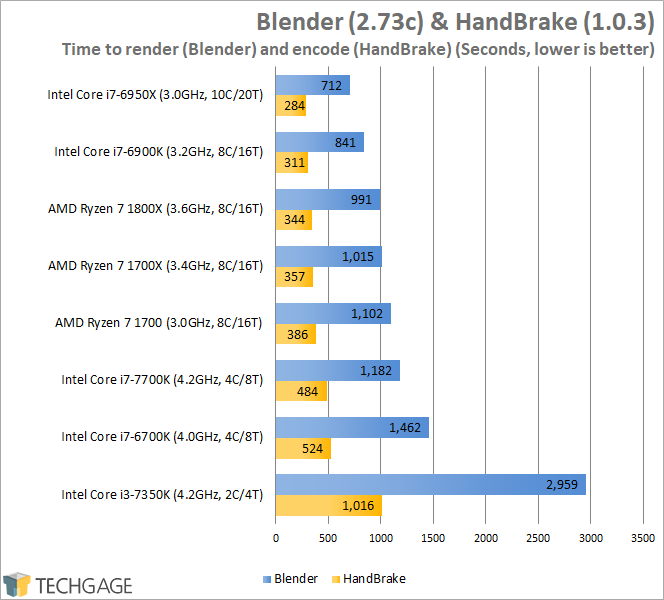
If you’re planning to use either HandBrake or Blender under Linux, then you’re going to love Ryzen. All three Ryzen 7 chips best Intel’s current quad-core champs, with the 6900K using its strong IPC to pull ahead of the 1800X.
How do these results compare to the same tests performed in Windows?
| Blender (Windows) | Blender (Linux) | HandBrake (Windows) | HandBrake (Linux) | |
| AMD Ryzen 7 1800X | 991 s | 991 s | 333 s | 344 s |
| AMD Ryzen 7 1700X | 1055 s | 1015 s | 349 s | 357 s |
| AMD Ryzen 7 1700 | 1083 s | 1102 s | 378 s | 386 s |
| Intel Core i7-6950X | 638 s | 712 s | 252 s | 284 s |
| Intel Core i7-6900K | 801 s | 841 s | 310 s | 311 s |
| Intel Core i7-7700K | 1184 s | 1182 s | 495 s | 484 s |
| Intel Core i7-6700K | 1356 s | 1462 s | 542 s | 524 s |
| Intel Core i7-7350K | 2455 s | 2959 s | 1026 s | 1016 s |
There’s no easy answer to that question, as both sides trade blows. An interesting result here is with the i3-7350K, which somehow performed much better with the Windows version of Blender, than the Linux one. At the same time, we have results like the 1800X, which took the exact same amount of time between versions.
What ultimately matters, though, is that all of the CPUs scale the same between versions. Both sets of results put Ryzen 7’s three chips right behind Intel’s top dogs.
Phoronix Test Suite
(Additional results from our PTS testing can be found here.)
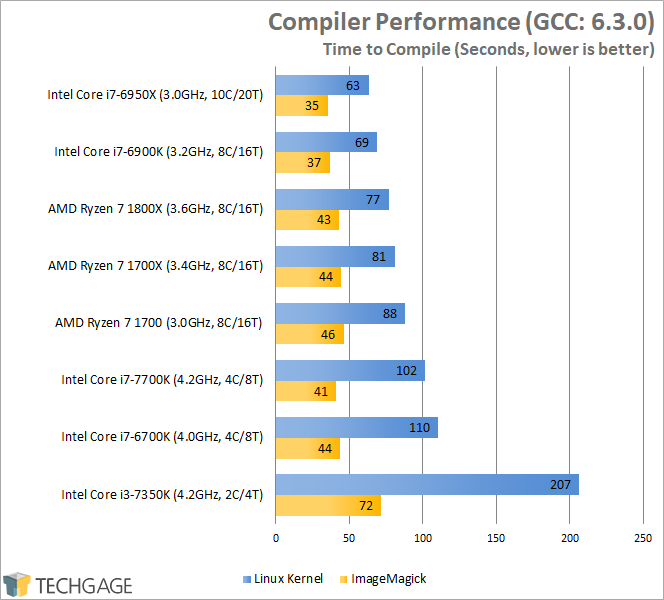
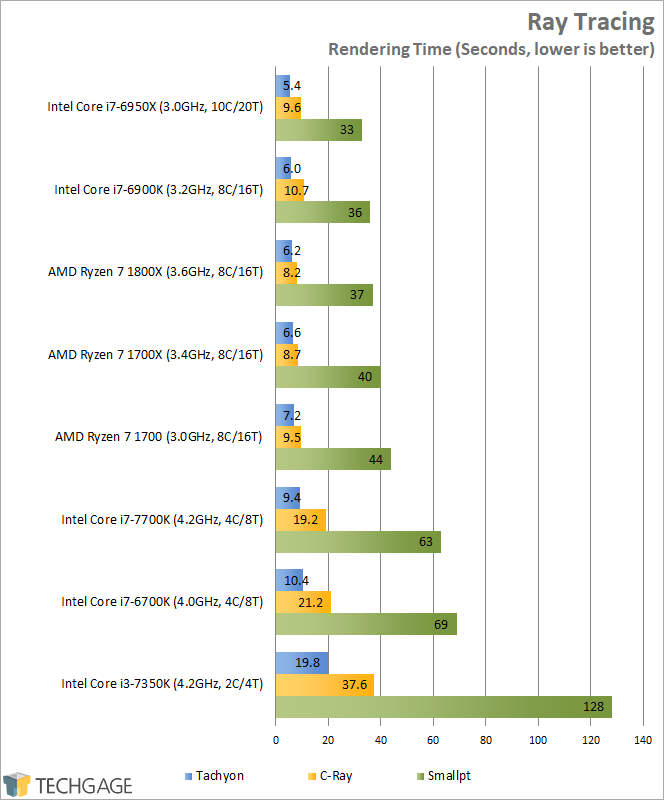
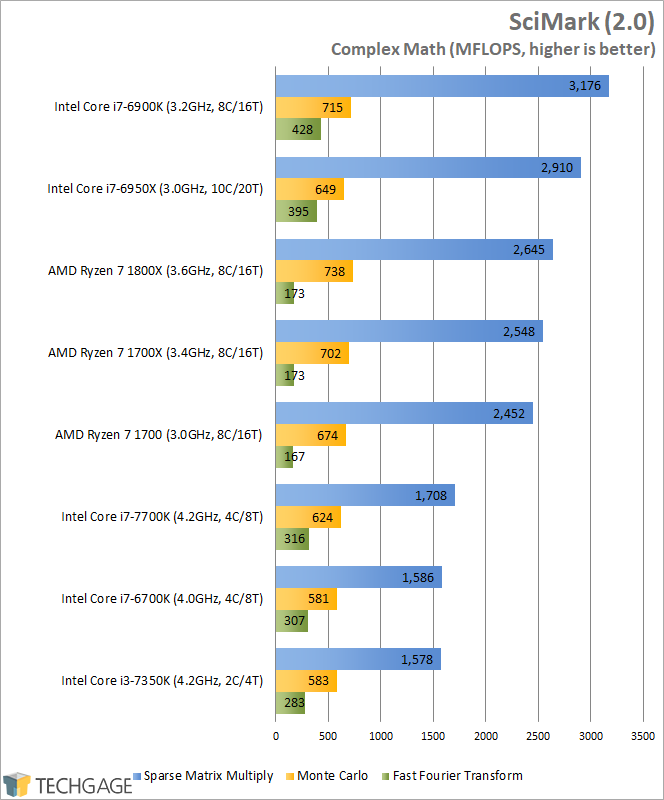
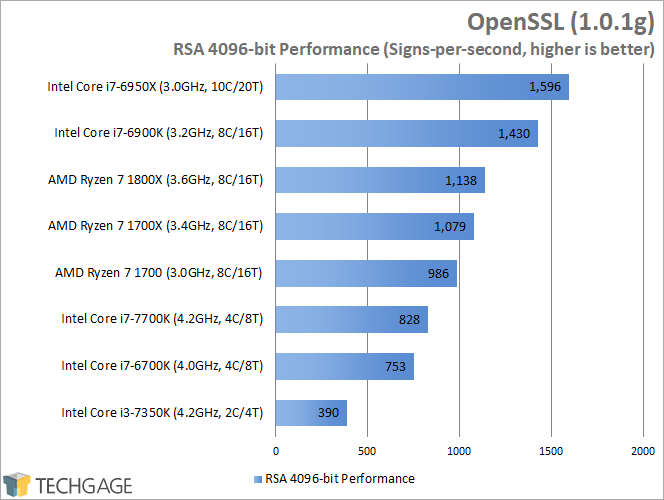
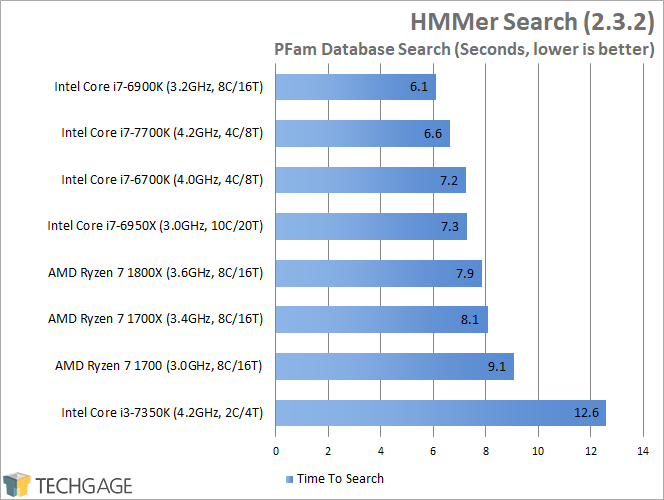
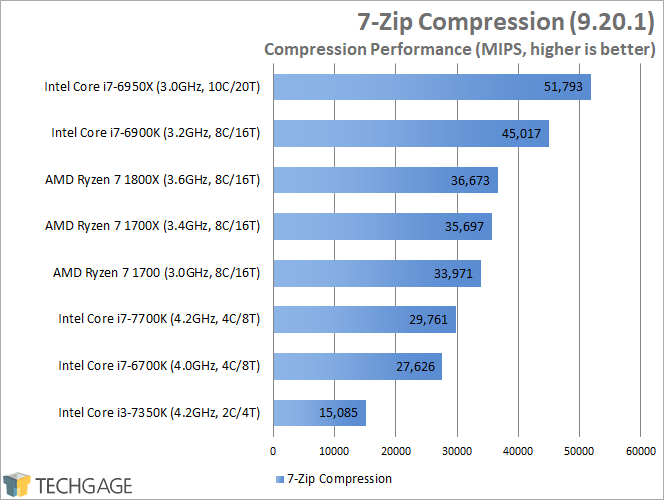
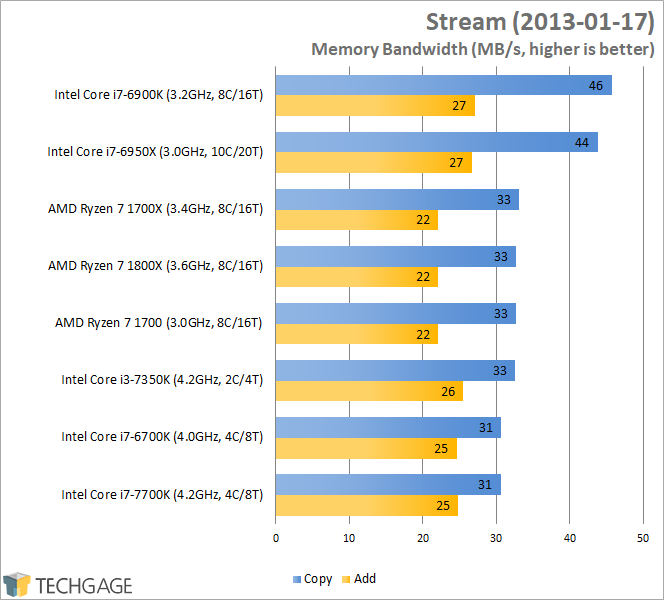
| John The Ripper (Encryption) | |||
| Blowfish | MD5 | DES | |
| AMD Ryzen 7 1800X | 12.8K | 200K | 44.6M |
| AMD Ryzen 7 1700X | 12.2K | 190.2K | 42.1M |
| AMD Ryzen 7 1700 | 11.1K | 168.6K | 38.3M |
| Intel Core i7-6950X | 16.7K | 207.7K | 22.9M |
| Intel Core i7-6900K | 15.2K | 190K | 20.7M |
| Intel Core i7-7700K | 9.0K | 109K | 22.0M |
| Intel Core i7-6700K | 8.2K | 99.5K | 20.1M |
| Intel Core i3-7350K | 4.3K | 52K | 10.4M |
In every single one of these tests, aside from the single-threaded HMMer, even the lowbie Ryzen 7 1700 placed ahead of Intel’s Core i7-7700K. Memory bandwidth isn’t quite as high as what we saw on Windows, but it scales the same – at least based on the Copy result.
On the Sandra performance page, Ryzen showed some serious strength in encryption, and through Jack the Ripper, we see more of the same strong performance, with all three Ryzen CPUs besting the Intel quad-cores, falling short only to the 6900K and 6950X, and only in the Blowfish test. DES is too insecure to be used nowadays, and it’s too bad, since Ryzen blows away its competition there.
Overall, a great showing from Ryzen through all of the tests. The 1700 still looks to be the best bang-for-the-buck, as it beats out the 7700K in every single test except the two single-threaded ones – which was to be expected.
Support our efforts! With ad revenue at an all-time low for written websites, we're relying more than ever on reader support to help us continue putting so much effort into this type of content. You can support us by becoming a Patron, or by using our Amazon shopping affiliate links listed through our articles. Thanks for your support!





